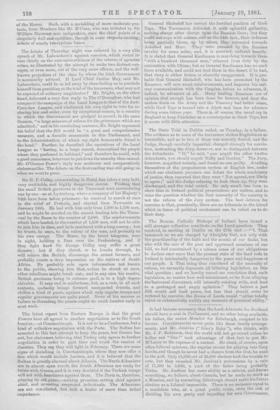Sir G. P. Colley, commanding in Natal,has taken a very
bold, very creditable, and highly dangerous course. Finding that the small British garrisons in the Transvaal were surrendering one by one—as• at Lydenberg, where a company of her Majesty's 94th have been taken prisoners—he resolved to march at once to the relief of Pretoria, and started from Newcastle on January 24th. He had with him only from 1,200 to 1,500 men, and he might be resisted on the ascent leading into the Trans- vaal by the Boers to the number of 2,000. The reinforcements which have landed, to the number of 1,500 men, will not be able to join him in time, and he is cumbered with a long convoy ; but he trusts, ho says, to the valour of the men, and probably to his own energy. The Boors, by the latest telegram, wore in sight, holding a Pass over the Drakenberg, and if they fight hard Sir George Colley may suffer a great disaster; but if they shrink, or ho breaks through, he will relieve the British, discourage the armed farmers, and probably create a .deep impression on the natives of South Africa. He probably acts upon information not known to the public, showing him that, unless he struck at once, other rebellions might break out ; and in any case his resolve, British garrisons being in extreme peril, is in a high degree chivalric. It may end in misfortune, but, as a rule, in all such contests, audacity brings forward unexpected friends, and strikes a kind of panic, against which only regular troops and regular governments are quite proof. News of his success or failure in threading the passes ought to reach London early in next week.






































 Previous page
Previous page